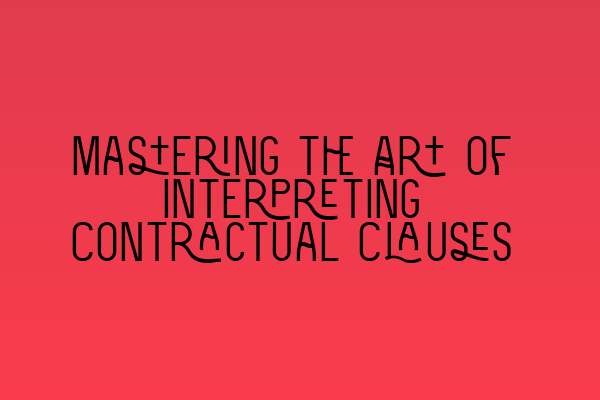As a solicitor, one of the key skills you must master is the art of interpreting contractual clauses. Contracts are the foundation of legal agreements and understanding the language and intent behind each clause is crucial to ensure successful outcomes for your clients.
Interpreting contractual clauses involves carefully examining the wording, context, and purpose of each provision in a contract. It requires a deep understanding of contract law principles and the ability to apply them effectively. In this blog post, we will provide you with some expert tips and techniques to help you master this essential skill.
1. Start with the Basics
Before diving into the complex world of contractual interpretation, it’s important to have a solid foundation of contract law principles. Familiarize yourself with the key concepts such as offer and acceptance, consideration, and legal capacity. This will provide you with the necessary framework to interpret contractual clauses effectively.
For SQE 1 candidates, we recommend taking practice exams to test your knowledge on contract law principles. SQE 1 Practice Exam Questions and SQE 1 Practice Mocks FLK1 FLK2 are great resources to test your understanding and identify areas for improvement.
2. Analyze the Language Used
Each word and phrase used in a contractual clause is significant and can have legal implications. Pay close attention to the language used and understand the meaning behind it. Look for defined terms and cross-references to other provisions within the contract.
If you come across unfamiliar legal terminology, consult a legal dictionary or online resources to ensure you fully understand the meaning of the words used. This will help you accurately interpret the clause and provide the best advice to your clients.
3. Consider the Context and Purpose
A contractual clause cannot be interpreted in isolation. You must consider the overall context of the contract and the purpose behind each provision. Think about why the parties included the clause and what they intended to achieve.
Make sure to examine any introductory or recital clauses that provide background information about the contract. This will give you valuable insights into the parties’ intentions and help you interpret the clauses more accurately.
4. Identify Ambiguities and Drafting Errors
Contracts are not always perfectly drafted, and you may come across ambiguous or poorly worded clauses. It’s your role as a solicitor to identify these issues and resolve them to avoid potential disputes in the future.
If you encounter a contractual clause with multiple interpretations or unclear language, consider various scenarios and assess the potential consequences of each interpretation. Seek guidance from case law or legal precedents to help you navigate through the ambiguity effectively.
Additionally, pay attention to any drafting errors, inconsistencies, or conflicts between different provisions. It’s crucial to spot these issues early on and raise them with the relevant parties to ensure clarity and enforceability of the contract.
5. Seek Expert Advice if Needed
If you’re unsure about the interpretation of a clause or facing complex contractual issues, it’s always best to seek expert advice. Consult with experienced solicitors or legal professionals who specialize in contract law. They can provide valuable insights and guide you through the process of interpreting the clause accurately.
Further resources such as SQE 2 Preparation Courses and SQE 1 Preparation Courses can enhance your understanding of contract law and help you develop the necessary skills to interpret contractual clauses.
Conclusion
Mastering the art of interpreting contractual clauses is an essential skill for solicitors. It requires a thorough understanding of contract law principles, careful analysis of language and context, and the ability to identify and resolve ambiguities and drafting errors. By following the tips provided in this blog post and utilizing available resources, you can enhance your expertise in this area and provide exceptional legal services to your clients.
Keep up to date with the latest SQE exam dates and requirements by visiting SRA SQE Exam Dates.
